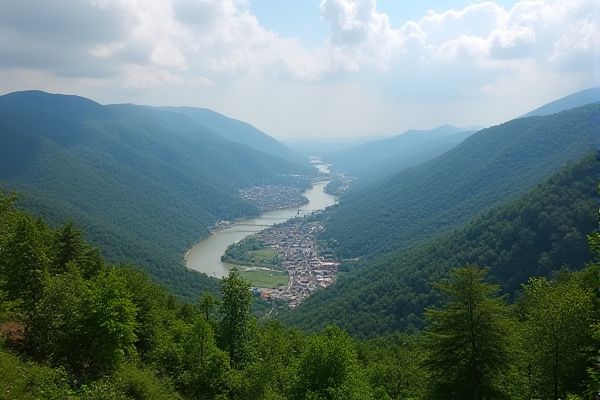
Local laws and regulations in West Virginia: Driving laws and speed limits. Hunting and fishing regulations. Zoning and land use restrictions. Alcohol sale and consumption laws. Building permits and codes. Employer labor compliance. Marriage licensing requirements. Child custody and support laws. Trademark and business registration. Environmental protection laws.
Driving laws and speed limits
In West Virginia, driving laws encompass various essential rules designed to ensure safety on the road. These include right-of-way regulations where drivers are required to yield to those already in an intersection as well as to oncoming traffic and pedestrians. Additionally, there are prohibitions on illegal U-turns, and two specific types of speeding limits: the basic speeding limit and the absolute speeding limit. The absolute speeding limit can vary depending on the location, such as 25 mph in neighborhoods and 55 mph on highways. For more details, you can visit West Virginia Driving Laws which provide comprehensive insights into these rules and their implications.
Hunting and fishing regulations
In West Virginia, hunting and fishing regulations mandate that both residents and non-residents acquire specific licenses, such as a base or combination hunting license and the Conservation Stamp. Moreover, there are additional requirements like hunter education certification for those under 18 and licenses tailored for various game types. Hunters must also comply with seasonal and location restrictions. Detailed regulations can be explored further through the West Virginia Division of Natural Resources. This ensures that all hunting activities are conducted responsibly and legally.
Zoning and land use restrictions
In West Virginia, zoning and land use codes are developed and enforced by local governments, categorizing land into residential, commercial, industrial, agricultural, and recreational uses, each with specific guidelines and restrictions to align with community goals and needs. These codes, including zoning ordinances and land use covenants, regulate aspects such as building sizes, development density, and environmental protections, varying significantly between counties and cities. For more detailed insight into these codes, the West Virginia Record Search provides extensive resources.
Alcohol sale and consumption laws
In West Virginia, the legal age to consume alcohol is 21, and the legal age to serve alcohol is 18, provided the server is supervised by someone 21 or older. Sales of alcohol are restricted by time and day, with different hours for various types of establishments. It is illegal to sell or serve alcohol to minors, and there are significant penalties for violations. For more detailed information, you can explore the State Law Sheet for West Virginia.
Building permits and codes
In West Virginia, building permits are mandatory for various construction projects, including residential, commercial, and renovation work, and must comply with the International Building Code (IBC) and International Residential Code (IRC) as adopted by the state. Local jurisdictions, such as Jefferson County, enforce these codes and have specific requirements and fee schedules for obtaining building permits.
Employer labor compliance
In West Virginia, employers must comply with various state-specific labor laws, including verifying employees' legal work status, adhering to the $8.75 minimum wage and overtime requirements, providing reasonable accommodations for pregnancy and related conditions, and following the West Virginia Safer Workplace Act for drug and alcohol testing. Employers must also comply with the West Virginia Human Rights Act, Equal Pay for Equal Work Act, and maintain specific payroll and employment records.
Marriage licensing requirements
To obtain a marriage license in West Virginia, both parties must be present and provide identification, such as a driver's license or birth certificate. The fee for the license is $56, but it can be reduced to $36 with premarital counseling. The license remains valid for 60 days. For those under 18, parental or judicial consent is required depending on the individual's age. For more detailed information, you can visit the Marriage License page on the Monroe County website.
Child custody and support laws
In West Virginia, a new custody law that became effective on June 10, 2022, presumes 50/50 shared equal custody between parents, establishing a balanced starting point for custody arrangements. However, this presumption is rebuttable if a parent can demonstrate that this arrangement is not in the best interest of the child. The law takes into account various factors, such as the actions of significant others, travel distance, and the child's well-being, to ensure a comprehensive evaluation of each family's unique situation. Importantly, the law permits modifications if there are substantial changes in circumstances, thereby accommodating the evolving needs of families. For more detailed insights, you can visit Legal Aid WV's article on the New Custody Law.
Trademark and business registration
In West Virginia, trademark registration is governed by Chapter 47, Article 2 of the WV Code, allowing for the registration of trademarks and service marks, with specific requirements for application, classification, and use. Businesses must also obtain a Business Registration Certificate from the State Tax Department, a requirement for all entities to operate in the state. For more detailed information, businesses can refer to the Trademark Registration Guide provided by the West Virginia Secretary of State's office.
Environmental protection laws
In West Virginia, environmental protection laws are primarily governed by the West Virginia Water Pollution Control Act (WPCA), which designates the West Virginia Office of Water Resources (OWR) within the Division of Environmental Protection (DEP) to preserve the state's water resources, including streams, lakes, rivers, wetlands, and groundwater. The DEP administers the National Pollutant Discharge Elimination System (NPDES) permit program, enforces anti-degradation policies, and regulates activities such as concentrated animal feeding operations (CAFOs) to control water pollution.
